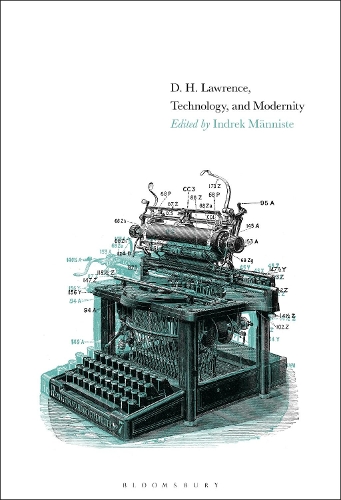
D. H. Lawrence, Technology, and Modernity
(Hardback)
Publishing Details
D. H. Lawrence, Technology, and Modernity
By (Author) Dr. Indrek Mnniste
Bloomsbury Publishing PLC
Bloomsbury Academic USA
7th February 2019
United States
Classifications
Tertiary Education
Non Fiction
Literary studies: fiction, novelists and prose writers
Literary theory
823.912
Physical Properties
Hardback
256
Width 152mm, Height 229mm
517g
Description
While the dehumanizing effects of technology, modernity, and industrialization have been widely recognized in D. H. Lawrences works, no book-length study has been dedicated to this topic. This collection of newly commissioned essays by a cast of international scholars fills a genuine void and investigates Lawrences peculiar relationship with modern technology and modernity in its many and varied aspects. Addressing themes such as pastoral vs. industrial, mining, war, robots, ecocriticism, technologies of the self, film, poetic devices of technology, entertainment, and many others, these essays help to reevaluate Lawrences complicated standing within the modernist literary tradition and reveal the true theoretical wealth of a writer whose whole life and work, according to T.S. Eliot, "was an assertion of what the modern world has lost."
Reviews
A great addition to D.H. Lawrences scholarship. Over the last two centuries, technology and mechanization have overwhelmed human beings, changing our lives at an alarming rate. This very thoughtful collection of essays highlights powerfully how Lawrences message is a never-ending struggle to cope with innovation and preserve our humanity. * Stefania Michelucci, Associate Professor of English Literature, University of Genoa, Italy, and author of Space and Place in the Works of D.H. Lawrence (2002) *
D. H. Lawrence, Technology, and Modernity sees Lawrence, as we might expect, as an opponent of the technological age. The main focus thoughwhich moves Lawrence to the centre of debates about modernism and the machineis on the writing as a profoundly thoughtful exploration of the new world that was coming into being. Editor Indrek Mnniste shows, in both the introduction and his own chapter, that Lawrence was particularly interested in the consequences for the body and mental life. The contributors pursue the volumes themes excitingly and convincingly in chapters that range in focus from green cultural critique to Lawrences robot poems, from trains to the First World War. * Howard J. Booth , Senior Lecturer in English Literature, University of Manchester, UK, and editor of New D.H. Lawrence (2010) *
[T]he collection offers a new perspective on Lawrences complex relationship with different forms of technology, and represents a valuable starting point not only for students of modernism but also for Lawrence scholars who wish to delve further into this exciting topic. * Modern Language Review *
Author Bio
Indrek Mnniste is Researcher of Literature and Philosophy at the University of Tartu, Estonia, and author of Henry Miller: The Inhuman Artist: A Philosophical Inquiry (Bloomsbury, 2013).
